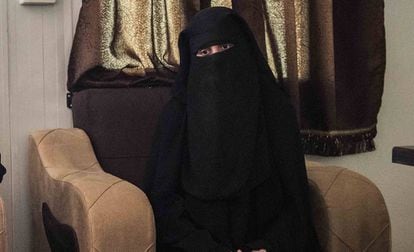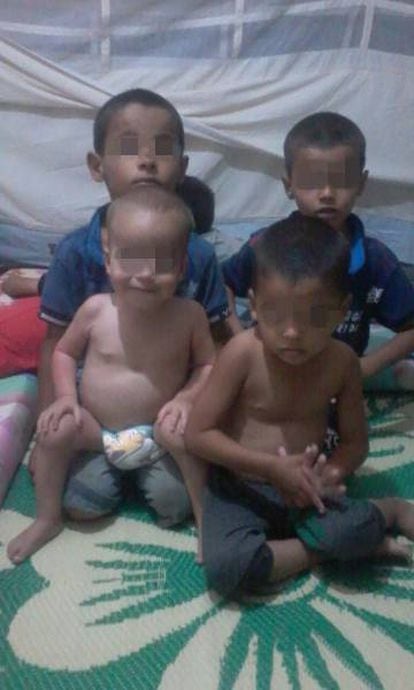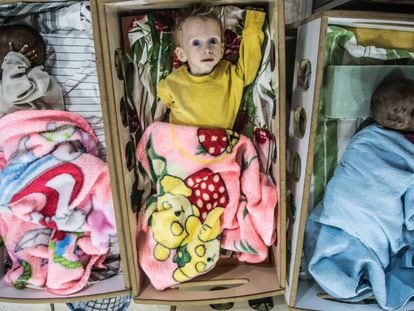The 16 Spanish children left trapped after the fall of the ISIS caliphate
Luna Fernández, the widow of a jihadist fighter, has just given birth to a baby girl in a camp in Syria, where 80,000 women and their offspring are awaiting repatriation


Her name is Asiyah, she is one week old, and she was born inside a tent at Al Roj camp in northeastern Syria. For the last five years this area had been part of the Islamic State’s self-proclaimed caliphate, which the child’s parents, the Spanish citizens Luna Fernández and Mohammed el Amin, had joined. But these days, it is Kurdish militias who are in charge of an area dotted with camps, and where more than 80,000 jihadist women and their children are waiting to be returned to their countries of origin.
Luna Fernández, 30, was in labor “for nine hours” and received no medical attention beyond help from an Indonesian jihadist who is a doctor and from “other women at the camp,” according to information obtained by Fernández’s relatives in Spain. “The little girl is big and fortunately both mother and child are doing well,” reads one of the messages sent from Syria, and to which EL PAÍS has had access.

The birth of little Asiyah brings to 16 the total number of Spanish minors trapped in the Syrian camps for families from the Islamic State (ISIS). The Spanish women who joined ISIS have been held for half a year now inside these camps, which have morphed into something of a miniature female caliphate dotted with abayat, the full-body black garments worn by the women there.
When the caliphate fell, the Spanish women were first taken to Al Hol camp, the largest of the six in this area. The first to arrive was Fernández, who was pregnant and in charge of eight children – four of her own and four more fathered by her husband with his second wife. The children’s father died in Syria.
The second Spanish woman to arrive in Al Hol was Yolanda Martínez, 34, who has four children. Her husband, the jihadist fighter Omar al Harshi, is the only Spanish citizen known to be held inside a Kurdish prison in Syria. And then came Lubna Fares, 40, who holds Moroccan citizenship but whose three children are Spanish because her jihadist husband, who also died in the caliphate, was a naturalized Spaniard.
All three of them were attached to the most radical core of foreign fighters who resisted to the end until the fall of the caliphate’s last stronghold, the dusty oasis of Baghouz on the border with Iraq. The last jihadist holdout fell in March after being targeted by Kurdish-Arab militias on land and by airstrikes commanded by a US-led international coalition of which Spain is a part.

Disease and insecurity
Since the beginning of this year, more than 300 children have died inside these Syrian camps due to respiratory problems, malnutrition and other diseases. There are 40,000 minors inside Al Hol, of whom 3,500 are foreign nationals – nearly half are European – while around 500 are unaccompanied minors, according to the non-profit group International Rescue Committee. “We don’t have the resources to deal with their needs,” insist Kurdish officials, who are urging countries of origin to take back their jihadist nationals or, failing that, to support the creation of an international tribunal in northeastern Syria. A few days ago, a delegation from the German government returned from Syria with four children, raising to 40 the number of European orphans who have been repatriated since March. Seventeen of these children are from France, seven from Sweden, five from Norway and two from the Netherlands, according to a tally by the Kurdish militias.
Fighting among women is a regular occurrence at the camps, where three Kurdish police officers were stabbed to death by jihadist women while a fourth was injured. “They kicked out my eldest son [Bilal, 14] from the tent because they say he is an adult,” Martínez claims.
Cases of cholera have proliferated due to the dirty water, as have the number of children with high fevers caused by snake bites. Children have their heads shaved to prevent the spread of lice. A non-profit worker with access to the Al Roj and Al Hol camps said in a telephone conversation that “medical and sanitary conditions are deplorable.” There is no drinking water for days at a time and “a shortage of toilets and showers,” adding to the psychological pressure on kids who are already traumatized by war and “constantly exposed to the radical rhetoric of many of the women there.” Martínez says that two of her children suffer from malnutrition, and that her daughter Aisha, who is six years old, only weighs 10 kilograms. “Her hair has fallen out, and her body is covered with hives,” her mother says.
Repatriation request
"There will be no decisions regarding the repatriation of Spanish nationals from ISIS in Syria until Spain appoints a government," says a government official in Madrid. According to this source, Spain's High Court, the Audiencia Nacional, is "putting together the legal case" so that returning jihadist women will "serve sentences," although the male Spaniard in a Kurdish-controlled prison was not mentioned. The most likely criminal charge they could face is being members of a terrorist group; this is the crime for which several members of the jihadist cell known as the Al-Andalus Brigade are serving eight-year sentences in Spain. The three Spanish adults currently in custody in Syria, as well as the two dead husbands, were part of this brigade.
In the absence of a European agreement to create a tribunal to try their nationals, countries fear the return of radicalized individuals whom they may not be able to try for lack of evidence. In the meantime, EU member states have begun repatriating their most vulnerable nationals: orphaned children.
In May, the three Spanish jihadist women said they were called by Kurdish agents who offered them the chance to sign a request for repatriation to Spain. Instead, Martínez and Fernández were transferred along with their children to Al Roj, where living conditions are better. Fares chose to remain in Al Hol with her kids. Three months after that apparent attempt by Spanish authorities at contacting them, both Spanish women at Al Roj claim that Kurdish agents have given them documents sent "from Spain" informing them that they may voluntarily request repatriation while knowing that they could face "prison terms of two to five years" back home. These letters, according to sources who are close to the women's families, state that repatriation could take place "within one or two months."
But relatives of both these women say they have received no response from the Spanish government following their request, filed on May 12, to have them and their children brought back to Spain.
As for authorities in the Self-Administration of North & East Syria (SA-NES), a body led by an alliance of Kurdish-Arab forces, they deny having received any kind of request from Madrid. “The Spanish government has made no official contact with us at any time,” says Abdulkarim Omar, who is in charge of external relations at SA-NES.
English version by Susana Urra.












































